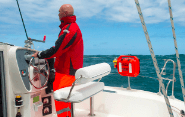Founded in London in 1860, The Royal Institution of Naval Architects (RINA), is an internationally renowned professional institution whose members are involved at all levels in the design, construction, maintenance and operation of marine vessels and structures. Members of RINA are widely represented in industry, universities and colleges, and maritime organisations in over ninety countries.
The Maritime Safety Award, sponsored by the Institution and Lloyd’s Register, is presented to an individual, company or organisation which has made a significant technological contribution to improving maritime safety or the protection of the maritime environment. Such contribution can have been made either by a specific activity or over a period of time.
Life Cell is redefining how safety equipment is stored on boats and creating a new category of safety equipment in an attempt to save lives. Life Cell is a buoyant float-free device that can store all essential marine safety equipment and was designed by a survivor of a rapid sinking off the coast of Sydney, Australia. It is like combining a life buoy and a grab bag in one device, two items that have undergone little innovation in recent history.
Jenny Aiken, CEO Life Cell Marine Safety, is thrilled that Life Cell has won this international award “to be recognised at the highest level by such an esteemed and long standing organisation as RINA, is truly amazing. It is exciting that an Australian invention from humble beginnings is having an impact on marine safety globally” she said.
Life Cell is currently being sold in Australia, United States, United Kingdom and Europe. The company has also starting working with aid organisations in developing countries, to help reduce the enormous number of fisherman who lose their lives every year in drowning related accidents.

